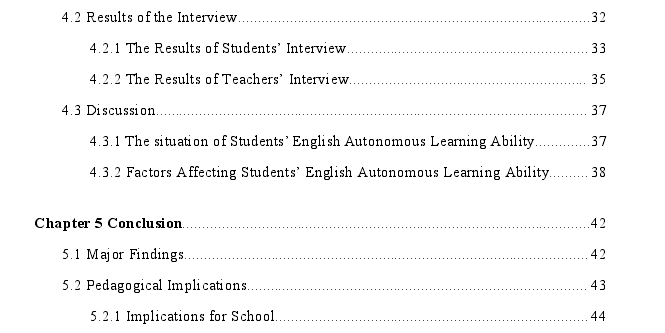英语论文哪里有?笔者认为学校应创造良好的自主学习环境。因为良好的校园环境可以潜移默化地影响学生的学习习惯,有利于学生自主学习能力的培养。然而,良好的环境创造离不开领导的决策,因为学校领导可以决定培养学生自主学习的方式。首先,学校可以通过建立自主学习能力研究小组,并通过理论和实践指导来培训教师。随着教师意识的提高,学生会得到更多的帮助,他们的自主学习能力也会更容易提高。第二,A、B、C学校可以加强沟通和讨论,也可以向其他学生自主学习能力较强的学校学习,发挥各自优势,为本校制定最适合自己的自主学习培训方案,让学生得到更科学的指导。
Chapter 1Introduction
1.1 Research Background
Since the end of the 1980s, autonomous learning has been focused on in China butthe short history of the research on autonomous learning system determines that therelated research results cannot meet the needs of educational practice. Subsequently, inthe late 20th century, an educational goal has been paid attention to cultivating students’English autonomous learning ability in many countries. Therefore, theoretical and appliedresearches on autonomous learning are unprecedentedly prosperous with variety ofresearch results emerging endlessly all over the world. In China, the basic educationcurriculum reform has made it clear to guiding students to learn independently. On onehand, it requires Chinese researchers to actively absorb foreign research results. On theother hand, it also requires them to provide more services for educational practice.Therefore, there are two reasons that spurred the production of this study. The first reasonis to meet the requirements of education reform and the new requirements of NormalSenior High School English Curriculum Standards. Over the past few years, Englishteaching has focused on cultivating students’ autonomous learning ability for a fairly longtime. In Fundamental Education Reform, the primary objective is to foster students’attitude towards autonomous learning instead of merely cramming knowledge and facts tostudents.

Chapter 3 Research Design
3.1 Research Questions
According to the subjects being tested and literature review in this study, it bringsabout two specific research questions. At this section, two primary problems aboutEnglish autonomous learning ability are showed in different levels but in a same age ofsenior high school students.
:1. What is the overall situation of senior high school students’ English autonomouslearning ability?
2. What are the factors affecting English autonomous learning ability of senior highschool students?
Chapter 4 Results and Discussion
4.1 Results of Questionnaire
In this section, the data is going to be showed concretely through tables and textualform for analysis of the questionnaire. In order to answer the first question, the value ofmean and standard deviation scores and percentage of descriptive statistics are applied.Means and standard deviations are calculated on analysis of the questionnaire data. Thereare three levels in students’ English autonomous learning ability according to theclassification standard of Oxford’s (1989). The mean value at low level is from 1.00 to2.49, the mean at medium level is from 2.50 to 3.49, the last is high level and its meanscores were from 3.50 to5.00.
4.1.1 Overall Situation of Students’ English Autonomous Learning Ability

Table 4.1gives a breakdown of the mean scores and standard deviation scores aboutthe overall level of senior high school students’ English autonomous learning ability inGuangxi Province. The overall level is 3.1 indicating that it is at the medium level.
4.2 Results of the Interview
The interview design is based on the questionnaire result. As we can see from theresult of questionnaire, we know that students’ English autonomous learning ability isrelatively weak in planning learning time, learning content and learning environment, learning method and learning outcome at senior high schools in Guangxi Province.Therefore, this study designs two different interviews to investigate 18 English teachersand 24 students in three senior high schools in Guangxi Province to explore the factorsthat may influence students’ English autonomous learning abilities. The results ofstudents’ and teachers’ interview are shown in the following section
4.2.1 The Results of Students’ Interview
Q1. Will you make an English learning plan by yourself or according to yourteacher's arrangement? Why?
Among the 24 students, 14 students have made learning plans by themselves suchas reciting English words and practicing oral English every day. But 10 students don’ttake initiative in making their English learning plan. Among them, 6 students make theirlearning plan according to their teachers’ arrangement. 4 students don’t make a learningplan because they thought it was meaningless, even though most of the students make alearning plan, but the time management is not good, they can’t complete their own studyplan, over time, nor adhere to their plan. Examples are:
S1 I make a study plan every day, but I can't finish it because I can't manage mytime.
S8 I can't make English study plan, because English is too boring, I don't want tolearn it.
S13 I can't make English study plan. I want to spend time on English when I haveEnglish class
Chapter 5 Conclusion
5.1 Major Findings
This research mainly investigates two research questions: 1.What is the overallsituation of senior high school students’ English autonomous learning ability? 2. What arethe factors affecting English autonomous learning ability of senior high school students?To answer the two questions, this study adopted questionnaire and interview approachesto explore students’ English autonomous learning ability at different kinds of school inGuangxi, and the major findings are summarized as follows.
Firstly, this study finds that students report moderate levels of English autonomouslearning ability. From the results of questionnaire, the mean score of students’ overallEnglish autonomous learning ability is 3.1, which indicates that students have a moderatelevel at English autonomous learning ability.
Secondly, this study finds that students' English autonomous learning ability hasdifferent performance in different schools. From the analysis of different schools, it isfound that only the “learning process” is higher than 3.000 at School A and School B, butmost dimensions are higher than 3.000 except for the learning content at School C.According to the result of questionnaire, it is found that students’ English autonomouslearning ability is relatively weak only in learning content at School C. But at School Aand School B, students’ English autonomous learning ability is relatively weak inplanning learning time, learning content and learning environment, learning method and learning outcome. Therefore, we know that students’ English autonomous learning abilityneed to be improved, especially in learning time, learning content and learningenvironment, learning method and learning outcome.
reference(omitted)

